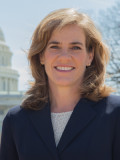By General Counsel K. Hollyn Hollman
 The BJC does not take a position on the legal status of same-sex unions. The increasingly frequent and intense claims linking gay rights and religious liberty, however, require attention. Charges that one’s adversaries violate religious freedom or the separation of church and state do little to advance the debate over marriage rights. Instead, they often cause confusion about the constitutional protection of religious freedom in America.
The BJC does not take a position on the legal status of same-sex unions. The increasingly frequent and intense claims linking gay rights and religious liberty, however, require attention. Charges that one’s adversaries violate religious freedom or the separation of church and state do little to advance the debate over marriage rights. Instead, they often cause confusion about the constitutional protection of religious freedom in America.
For the BJC, promoting religious liberty for all means protecting the rights of individuals and faith communities to believe and practice their religion as they see fit and keeping the government from advancing or inhibiting religion. It is a fundamental value that deserves and enjoys broad support. Maintaining our large Baptist coalition to preserve the Baptist legacy of defending religious freedom is challenging enough; building a consensus on religious or public policy concerns beyond our core mission would be impossible.
On the question of who should receive the legal benefits of marriage, there is no single “religious freedom” answer. Admittedly, the fact that “marriage” has both a civil and a religious meaning complicates the discussion. Yet a state’s determination about legal benefits to couples is similar to other policy questions about which religious individuals and communities disagree. The fact that the opinions of some advocates are grounded in church teachings may explain the passions that have been ignited, but it hardly suggests that one side holds a trump card.
The debate has been distorted by advocates on all sides. Some vocal opponents of same-sex marriage rely on the Bible to define marriage as between a man and a woman and oppose state recognition of same-sex couples because it legitimizes conduct they believe is immoral. Claiming to speak for the religious majority, they argue that the state’s action violates their religious freedom. Yet, religious individuals and communities regularly challenge the morality of practices that are legal, including sex out of wedlock. Just because a law sparks moral objections does not mean that it violates the Free Exercise Clause.
On another side, some proponents of same-sex marriage claim that the separation of church and state should preclude the government from recognizing only traditional marriage. They reject laws defining marriage as between a man and a woman because they see them as based on religious teachings that they reject. But, just because a law – like the prohibition on theft – happens to conform to the religious opinions of the majority does not mean that it violates the Establishment Clause.
Instead of making such broad and misleading claims, advocates for religious liberty on all sides of the marriage debate would be better served by trying to specify the interests at issue, the conflicts between competing rights, and possible ways of minimizing harm. Where and how are gay rights and religious liberty rights likely to clash?
First, there are concerns about the autonomy of houses of worship. Predictions about forced marriages and jailed clergy are misguided. The First Amendment ensures that faith traditions will continue to make their own decisions about the marriages they will perform regardless of the legal status of same-sex couples. Already, the government approves many marriages that churches do not, and churches impose requirements on marriage that the law does not. Likewise, freedom of speech ensures that pastors from across the theological spectrum will continue to speak freely in the pulpit on the basis of religious teachings, not legal prohibitions.
Second, and more difficult, there are concerns about the liberty of other institutions — such as schools and hospitals – organized by religious entities that oppose same-sex marriage. There have long been conflicts between legal protections based on sexual orientation and those based on religion, particularly in the employment and public services contexts. Whether religious exemptions should accompany laws providing greater protection to same-sex couples is a significant issue and legitimate ground for debate. Such exemptions, whether viewed as constitutionally mandated or simply permissible, protect the religious freedom interests of autonomy and self-definition. Depending on how they are crafted, they may well give all sides in the marriage debate most of what they want.
Perhaps it is not surprising that in the debates over legal rights for same-sex couples, many claim support from our country’s proud tradition of protecting religious freedom. But it is important to recognize that supporters of religious freedom (and of the BJC) are on different sides of the debate. The BJC is following the debate closely, with our eyes focused on defending and extending religious freedom for all. Finding a way through the thicket of competing claims is difficult. We would all do well to remember this: the simple fact that a state’s marriage laws conflict with certain religious beliefs while conforming to others does not by itself threaten anyone’s religious liberty.
To read more about marriage from the BJC, read “Religious Liberty and same sex marriage” by General Counsel K. Hollyn Hollman from the May 2013 Report from the Capital.
From the June 2009 Report from the Capital. Click here to view the entire magazine as a PDF.





